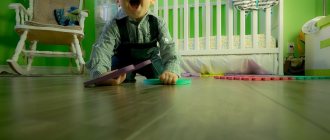The child forgot his sports shoes at school, did not write down his homework in his diary, and did not buy bread at the store on behalf of his parents. The list of situations involving childhood forgetfulness is endless. What to do if a child has a bad memory? Do not rush to scold or punish your son or daughter for such mistakes. First you need to determine the reasons for this behavior.
Attention and memory are cognitive abilities. They develop gradually. Preschool children remember information mechanically, without the use of special techniques. Developmental classes are needed that can teach how to manage memory and use techniques for logical comprehension of events, phenomena, and things.
What influences memory formation?
Children 4-6 years old remember information regardless of their own desire. This happens in the context of a certain activity, most often a game. Preschoolers remember what they paid attention to during any activity.
Research has proven that preschool children's memory is episodic. In one of the experiments, the children were shown two houses. One was blue, the other green. Each of them contained a set of objects. After looking at them, the children were asked to name them. From a group of 10 people, everyone coped with this task, but none of the subjects could correctly name the color of the house.
The experimental data suggests the following:
- to remember objects in a certain connection, in time, in space, training is needed;
- Many children of preschool age have better developed long-term memory. They remember events that happened long ago, but are unable to retell a telephone conversation with their mother that took place 15 minutes ago.
Patience and training help develop short-term memory.
Diagnostics
Before prescribing treatment for your child, we perform a comprehensive neurological examination. It includes:
- collecting anamnesis - a conversation with the mother (the course of pregnancy and childbirth, the development of the child in the first year of life), studying the child’s medical record and the results of previous examinations;
- special neurological tests;
- local, palpation examination of the spine and joints;
- reflex diagnostics and muscle tests.
If necessary, the following may also be prescribed:
- Ultrasound of the brain (Neurosonography);
- Ultrasound ultrasound of BCA;
- X-ray of the cervical spine;
- EEG (Electroencephalogram);
- Lab tests.
Do not engage in self-diagnosis and self-medication; only a pediatric neurologist can determine the true state of the child’s nervous system and, if necessary, prescribe adequate treatment, aimed primarily at eliminating the causes that may interfere with the normal development of the child.
When do memory problems occur?
Poor memory and attention in children are relatively common. For the first time, parents may notice that their son or daughter has memory problems when the child is 5-6 years old. At this time, many kids go to preparatory lessons before first grade. In class, they need to learn and remember new material. There are times when some children find it difficult to achieve this. Mom and dad should not shy away from this problem. Otherwise, in the future the child will have great difficulties with memorization, it will be difficult for him to learn and develop. In addition, classmates may get involved and make fun of the child’s inability to remember basic things. Because of this, the student may experience psychological trauma.
Answer the following questions:
- Is it true that your child cannot answer the questions asked?
- Is it true that your baby doesn’t want to do basic tasks?
- Does your child have a lack of concentration?
- Is your son or daughter having trouble following the rules?
If you said Yes at least once, then you should devote more time and attention to the development of your child’s memory.
Finding the Roots of the Problem
The appearance of memory problems in a child is an alarming call. The cause may be either simple fatigue and absent-mindedness, or functional disorders of brain activity. Constant monitoring on the part of parents of the ability to learn and remember new skills is a guarantee of the correct development of the little person.
Whether a child has memory problems can be determined by noting the following behavioral features:
- Insufficient adequacy of the baby in communicating with friends;
- Difficulties in responding to direct requests;
- Problems in completing new tasks;
- Complete confusion and misunderstanding in complex matters, an attempt to abandon them;
- Problems with attention;
- The child cannot apply skills in the instructions given to him.
Problems with learning may be caused by social, hereditary and acquired conditions of memory impairment. Social reasons include family lifestyle, constant lack of necessary foods and vitamins in the baby’s diet. It has a negative impact on development if the child almost never spends time in the fresh air or is not given much exercise; he is left to his own devices.
Hereditary causes include congenital mental retardation. In the case of acquired memory problems, the cause may be mental illness, the consequences of severe brain injury, conditions after a coma, or intoxication.
Partial memory loss is not uncommon after infectious diseases. In most cases, partial memory loss is possible due to a combination of several circumstances: an unfavorable environment in the children's group and at home, anxiety and fears, lack of vitamins.
Causes of poor memory in children
If a child does not remember well, you need to look for the reasons for child forgetfulness. The cause of problems can be excessive loads (clubs, extracurricular activities). Nowadays, children are increasingly tired because they do not have enough time to rest, they are busy at school, then they run to tutors, then to creative clubs. The kids come home, they don’t even have the strength to have dinner, and they still have homework to do.
Poor memory can also be caused by sleep problems: poor sleep, insomnia, difficulty getting up in the morning. Don’t forget about poor diet and lack of routine. If a child eats a bun from the buffet on the go and goes to bed after midnight, then it is not surprising that it is difficult for him to perceive new information. All this does not affect children’s memory in the best way, but it is fixable if you act wisely.
What should parents do?
When parents suspect that their child has memory problems, do not waste time, go to a doctor for a consultation. If you went and he has no physiological problems, now it is important to understand what to do about it next. In any case, the situation cannot be ignored or left to chance. It will only get worse. We suggest the following actions:
- Analyze how busy your child is
. Take into account all the activities that distract his time. This includes studying at school, doing homework, watching TV, studying in additional clubs, sections, and reading books. Now look how much time the child has to rest. How often does he go outdoors? Pay special attention to a clear daily routine, quality and duration of sleep. In the modern world, children get tired no less than adults, and sometimes even more. They get tired. Due to excessive stress, the child does not regain strength during sleep at night. As a result, he develops understandable absent-mindedness, which leads to irritability, tearfulness, and apathy.
- Lack of nutrients, microelements, vitamins.
Make sure your child is eating properly and whether he or she is getting enough of the necessary substances for the body. Assess the amount of fluid your body receives. Lack of water negatively affects the functioning of the brain, which leads to memory impairment. Consider whether your child has enough iodine in his diet. Does he eat seafood, seaweed, and does he include iodized salt in his diet? Against the background of iodine deficiency, the overall development of children and their memory deteriorate. They get tired quickly. Their fatigue becomes chronic, their performance at school drops, and their mood becomes depressed. If you suspect a lack of iodine in your body, consider supplementing it.
- No memory training sessions
. If this is the problem, then it’s worth working on memory development.
If children have difficulty expressing their own thoughts, then this is a reason to be wary. Typically, poorly developed speech is a consequence of poor memory.
How to improve your child's memory?
It is useful to start training children's memory from the cradle. Rhymes and songs, fairy tales and short stories help in this matter. Experts in child psychology strongly recommend taking a closer look at folk tales that involve many repetitions of words and phrases. Constantly hearing the same thing, the child involuntarily records what he heard in his memory.
When the baby can not only memorize, but also independently reproduce rhymes, adults should encourage this and often praise the baby for the work done. A situation of success will have an amazing effect on the child. He will strive to memorize the verse again and again in order to receive praise again. In this case, memory will develop just fine.
Communication is no less effective in the process of training a child’s memory. Parents should talk to their child as often as possible, discussing any topics and taking an interest in the day. Let the child not only answer, but also listen. Adults are recommended to demonstrate something new to the child, while emotionally describing the object and focusing on minor details. A few days after the conversation, you need to ask the child about what he managed to remember.
The game is another important moment for memory training. You need to play with your child every day, and the games should be interesting. There are many games for developing memory. You can find them in books, on the Internet, or ask psychologists. In this digital age, there are also many mobile applications and computer games that can help train your child’s memory.
The importance of proper nutrition
A balanced, nutritious diet increases the chances of recovering temporary memory impairment. It is necessary to normalize the water balance, therefore, the child must drink the required amount of drinks, freshly squeezed juices and water. Basic products for a complete schoolchildren's diet:
- Sea products (shrimp, fish, kelp) - up to 3 times a week;
- Nuts (almonds, hazelnuts, cashews, walnuts) - 3-4 nuts per day;
- Fruits vegetables;
- Berries, especially blueberries, cranberries and black currants;
- Cereals - buckwheat and oatmeal;
- Adding sesame, pumpkin and sunflower seeds to salads and cereals;
- Honey, chocolate, dried fruits;
- Milk - at least 2 glasses per day.
It is necessary to plan the child’s daily menu in such a way that the supply of nutrients from food is complete and of high quality. You should monitor your water balance throughout the day; priorities are freshly squeezed juices, fruit drinks, and herbal infusions.
Memory training exercises
If a 5-year-old child has poor memory, then special exercises will help him. Psychologists advise developing all types of memory in children aged 47:
- motor. The kids are happy to play the game Come on again! An adult leader leads one of the participants along a certain route. The child is blindfolded. During the movement, he is asked to sit down, jump on one leg, and raise his arms up. The point of the game is to repeat all this exactly, but with your eyes open.
- visual. A common exercise is completing the missing elements. Children are allowed to look at a picture and then shown another one, similar to the first one, but with some elements missing. The task is to reconstruct the drawing from memory;
- auditory and associative. A very simple but effective exercise is to name children any words that mean objects and ask them to convey their thoughts about their properties, appearance, and characteristics.
The listed exercises can be performed at home or you can choose special classes, for example, a Memorics course, focused on the development of all types of memory. The program consists of several sections. Learning allows you to effectively apply useful memory techniques.
A child's memory is better than that of adults
The memory of children and adults is different. Kids remember easier, but forget faster. So any comparison is incorrect. A child’s memory is involuntary, unintentional, selective and closely related to sensations and perceptions. Therefore, children remember something more easily that is visual, bright, and interesting. Children remember better through tactile sensations, when they can touch and play with objects. Children sometimes confuse images of memory with images of imagination: this is how an unintentional lie arises. The child’s motor, figurative, and emotional memory is most developed, and verbal memory is weaker: the baby better remembers objects and pictures, emotional stories and descriptions. Preschool children quickly memorize rhymes, counting rhymes, and funny tongue twisters based on “associations,” but when the child retells familiar fairy tales and stories, logical thinking is activated. That’s why it’s so important to read more often with your baby.
Method 3. Play words with your child
- Tell your baby 10 words and ask him to repeat them. You can choose words on a specific topic (fruits and vegetables, food, toys, trees, flowers, what objects are in the room, etc.). All the words that the child did not name must be reminded. It is believed that if a 6-7 year old child can repeat 5 words out of 10, he has a good short-term memory, and if he says 7-8, his long-term memory is also well developed.
- To develop visual memory, you can lay out pictures (for example, 5-7 pieces) and ask him to remember them . Then you can remove one or two and ask what is missing, or mix all the pictures in places and ask the child to put them in the original order.
- With older children you can play this game a little differently. Place a photo or picture in front of them with lots of details. Let the child look at it for 15-20 seconds, trying to remember as many details as possible. Then remove the picture and ask him to write down a list of everything he remembers on a piece of paper.
The child is behind in school, has very poor memory: Reviews from readers
Angelika Vertepnaya, 36 years old (Moscow). Interesting article, I learned a lot of exercises. Our son is 7 years old and we have a problem with poetry. He falls behind in school precisely because of memory problems. Difficulty remembering multiplication tables. I will use these tips, I hope it helps. Inna Markova, 32 years old (Kaliningrad). Thanks a lot! I will definitely use a similar technique, because my daughter has a real problem with her memory. At school she is very behind her peers, as she cannot remember at all what the teacher tells orally in class. I didn’t even think that games could be used to improve and develop memory. I thought that she was so inattentive among us, but it turns out that the problem is that I didn’t know how to deal with my daughter.
Irina Stepanenko, 33 years old (Taganrog). I read it carefully and completely agree. With the help of such games and exercises I was able to improve my son’s grades. Since the 1st grade, the child was very behind in school due to poor memory. But we realized it in time. Indeed, by devoting at least half an hour every day to such tests and assignments, within a month your children’s performance will improve, and it will be much more pleasant to look at the diary with grades.
Olga Soldatko, 41 years old (Raduzhny). Complete nonsense. These tests won't help anything. A child with poor memory should be shown to a psychologist or speech therapist if he cannot retell the text or express his thoughts in words. If he is behind in school, he needs tutors.
Anton Goryansky, 44 years old (Sevastopol). I read the article with interest with my wife and thought about my own son’s assessments. After all, our child’s really low academic performance lies solely in poor memorization of the material. He became retarded precisely because of his weak memory. We are grateful to the authors, we will take care of the child with the help of your exercises.
Kira Sidorchuk, 30 years old (Tyumen). Thank you very much for the good advice. The child is 8 years old, starting school this year, but his memory is in trouble. We've been in last place at school since the 1st grade and we can't get out of it. I noticed that I remember very poorly the material covered in class. I will try to play the games described here with him and practice more often. Thank you for the practical tips, I will believe that everything will work out for us.
Method 2. Read books with your child
While the child is still small, read to him, for example, interesting, memorable fairy tales or poems before bed. Try learning small quatrains by heart together. This will have the most beneficial effect on your baby’s vocabulary. And when he learns to read on his own, try to instill in him a love for this activity.
Let the book become a good friend for the child. Even if the child doesn’t really want to, let it be a mandatory rule for him to read several pages a day of a book. And be sure to ask him to retell what he read and express his opinion.
Method 5. Master the Cicero method
The essence of this method is to mentally arrange the objects that need to be remembered in a well-known space - this could be your own room, the attic, or any room that the child knows well. The main rule of this principle of memorization is that we mentally reduce large objects, and increase small ones.
For example, a child needs to remember 5 words - umbrella, bear, orange, hippopotamus, sea, chair. All these words need to be mentally placed in the room: an umbrella should be hung on the door handle, a large orange should be placed on the windowsill, a chair should be placed in front of the bed, a tiny bear should be sent for a walk under the flower on the window, and a small hippopotamus should be sent to sleep on the bed, and the sea should rage on the TV. After some training, the child, in order to reproduce the chain of words, will only need to recall the interior of his home in his memory.










